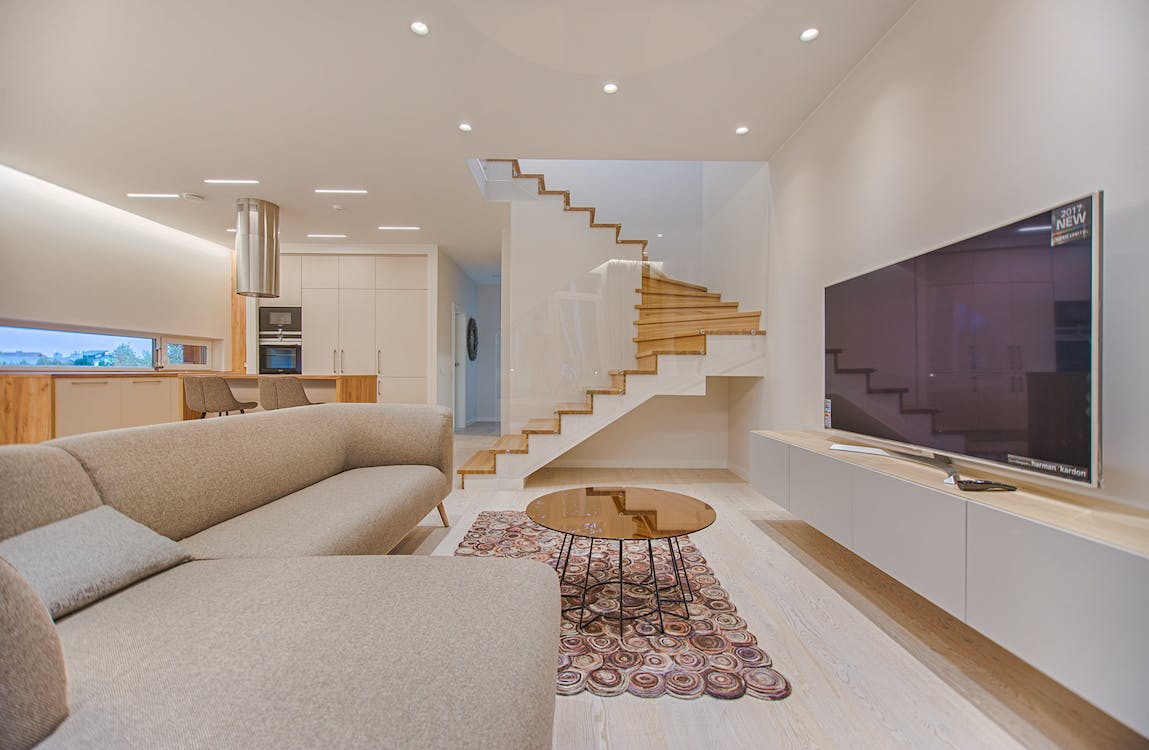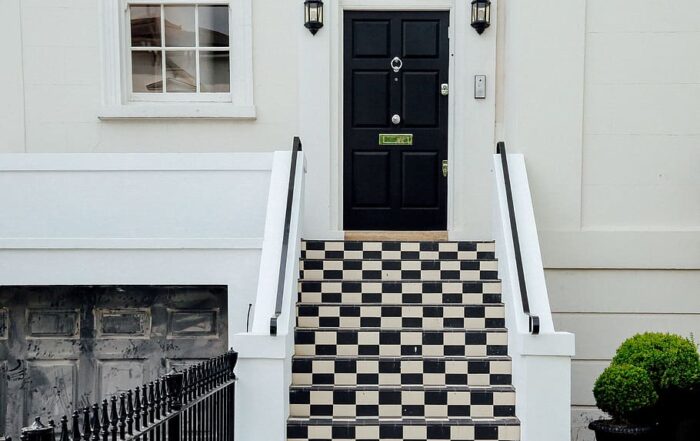
A Guide to Buying or Selling a Smart Home
Date Posted:
September 9, 2022
Share This:
Smart home theaters that stream your favorite entertainment and determine (correctly) what you’d like to watch next. Controlled lighting that offers perfect ambience at any time of day. Climate automation that keeps the temperature ideal and cost-efficient.
And easily commandeering all these features and more with the touch of a button.
It’s not science fiction — it’s reality, and it’s the beauty of streamlined smart homes. Analysts predict the smart home market will reach approximately $140 billion by 2026, and that number should keep climbing. Smart home resale values are up to 5% higher than non-smart homes — not a paltry percentage.
Perhaps unsurprisingly, millennials are at the forefront of the smart home market. But people of all ages are seizing the many advantages that integrated smart home systems offer.
[Related: Smart Home Systems: Where to Begin]
What Makes a Smart Home “Smart”?
Smart homes contain smart gadgets and integrated smart systems. So, exactly what is a “smart home” gadget? Most smart home gadgets use Wi-Fi connections and artificial intelligence (AI) to simplify or automate aspects of daily life.
A combination of these factors makes a home a smart home. But are all those gadgets worth it?
Keep reading for our breakdown of what you need to know about buying and selling a smart home.
Understanding Fixtures vs. Personal Property
When buying or selling a smart home, it’s good to know the difference between fixtures and personal property. In the broadest sense, fixtures are anything installed in or around a house.
A microwave permanently installed in a kitchen is a fixture, but what about a freestanding microwave that plugs into the wall? The microwave oven on the counter is personal property and usually goes with the seller.
However, you can label any part of the home a “fixture” in the sales contract. Items that seem permanently installed actually might be private property.
Regardless of the old standby rule, the definitions of fixtures and personal property are up for negotiation. It’s all between the buyer and seller.
Sellers often include fixtures in real estate listings and sales agreements. If you’re selling a smart home, don’t forget to include all its remaining appliances and fixtures.
[Related: Design Considerations for Incorporating AV Into Your Home]
Buying a Smart Home
New homeowners should immediately set up new accounts and update any necessary home technology.
It’s important for a buyer to take immediate steps to secure their new home’s smart tech systems, especially if they’ve just bought a property with cutting-edge home technology equipment. Create new accounts as necessary, and change your passwords often.
Additionally, find out what kinds of smart devices the seller has to offer. Include stipulations in the purchasing agreement to make sure that information is clear for both parties. Delete all data, and then check the devices’ security settings.
Even if you’re purchasing a brand-new property, you should take these steps for your personal safety. Someone else may have used your new home’s amenities without your knowledge. To learn about a product’s warranty and how to contact technical support, see the owner’s handbook (if one is not physically available, search online).
It’s wise to check current market prices and make sure you don’t overpay for a smart home — a smart home costs more (as it should), but spend according to the tech included.
[Related: Home AV Systems: Planning for Expansion]
Selling a Smart Home
While showing off your home to potential buyers, you may want to leave some smart gadgets operational. First-time investment in smart tech won’t increase your property’s value immensely, but it may help you sell the home far more quickly.
Here’s a tip: Fine-tune any active smart home gadgets before listing the home for sale.
Next, we’ll offer suggestions for how to set up your smart home for showings so potential buyers aren’t intimidated. We’ll also note how to keep the accounts associated with the smart gadgets you bring with you when you leave your current home.
Show Off Your Tech
For starters, an inexpensive feature like a smart thermostat might be a selling point. Don’t spend a fortune on unnecessary smart tech if you want to sell your home for a profit. However, installing a few automated devices before listing your home for sale will most likely get you more offers.
Because there are plenty of people interested in incorporating it, most brokers and agents think smart home technology helps with marketing — and speeds sales. More than 40% of buyers are curious about smart tech, per the National Association of Realtors.
For example, a high-tech smoke alarm is unnecessary. The $120 alarm isn’t much better than the $40 listening device. As long as you’ve installed working smoke and carbon monoxide detectors, the high-end smart smoke detector won’t be too much of a draw.
Unless you plan to sell your property along with an existing smart home hub configuration, you can safely leave it off your list of essential improvements.
However, by simply swapping out a few light switches, you can show off what it’s like to have Wi-Fi-connected lighting throughout the home. Smart lighting also doesn’t need a hub to function. In permanent lighting installations, use smart light bulbs instead of regular light bulbs.
If you decide to upgrade to smart home tech, consider Lutron automatic smart blinds or Wi-Fi-connected washers and dryers from LG, Samsung or GE. These amenities can boost your property listing, and you can leave them behind when you sell. The same general rule applies to any climate control tech.
Educate Your Agent
The real estate agent presenting your property should be familiar with its smart features. Unique features, like those found in smart homes, can increase a home’s value and attract a long list of buyers.
Think about what the next homeowner wants. For example, you could ask your agent to leave a tablet or smartphone (and the apps necessary to use it) with a guest login for the next potential buyer’s convenience.
If the agent doesn’t know how to use the technology, then it may simply take up space and not help sell the home.
[Related: How Home Automation Is Transforming the Rental Industry]
Switch Out What You’re Taking With You
Remember to remove any smart gadgets that aren’t part of the transaction.
Take all your core smart tech with you to your new home. If you used any items for staging, take them, too — and make sure the agent understands beforehand. For example, if you don’t plan to include a smart thermostat in the sale, replace it with a standard thermostat before you move.
As another tip for selling a smart home, install standard smoke and carbon monoxide detectors in every room before the agent gives tours. Having a thermostat for the heating and cooling system is also a wise decision. You can ask the agent to show how the home may accommodate smart tech without including that tech in the sale.
Shut Off Any Microphones
Before the agent gives tours, turn off any smart microphones and home surveillance systems. For example, potential buyers will know it’s safe to chat openly because any security cameras are clearly unplugged and leaning against a wall.
If you want to use smart displays or speakers for staging, disable microphones and cover cameras. Do the same if you want your agent to demonstrate the home’s features using the potential buyer’s personal voice-enabled smart system.
Because it’s safe to assume most homes on the market now have at least one smart device, some brokers advise buyers to stay silent while viewing the property and to voice their opinion only when they’re back outside!
Some agents may enter a home and say, “Ok, Google” or “Hi, Siri” to check whether a system is active.
All the same, when selling a smart home, you can have your agent show off the home’s capabilities. They might show where smart home security systems and voice-enabled speakers might go (or where you placed them) without the devices being present.
[Related: Are Smart Home Devices Secure?]
Always Do a Factory Reset on Your Electronics
First, make a comprehensive list of all smart gadgets in the home, as well as the accounts and services they use.
As a security measure, the Federal Trade Commission recommends listing any smart gadgets in the home if the buyer will acquire any of your smart devices. These include not only items like thermostats and light bulbs but also any remnants of a security or surveillance system.
Once you’ve listed all items and services, cancel or change the account settings before you move. You can find most factory default settings using basic search engines.
For example, to reset a group of linked light bulbs, all you usually have to do is repeatedly flip the group switch. You can also use the accompanying app to manually remove devices from your personal accounts.
If you want to omit a gadget from your Google, Amazon or Apple account, get rid of the account altogether. Put off any repairs until you’ve moved into your new home. It’s far easier to clear out and start over than it is to go through each piece of equipment and ensure it’s no longer connected to your previous smart home.
If you leave smart tech behind, leave only factory-reset Amazon, Apple or Google smart speakers. Most Google gadgets have a dedicated button on the bottom that you can use for factory reset. A FAQ is available for Amazon Echo smart speakers, and Apple provides similar help for its HomePod.
Finally, leave the smart devices’ boxes and instructions in a visible location (like you’d leave paint cans for new owners so they can match the color). Tell your agent all applicable information so they can inform the new homeowners.
As a tip, it never hurts to consult with an audiovisual (AV) consultant to check for anything you’ve missed.
[Related: Five Smart Gadgets for Your Home]
Simplify Your Smart Home With AV Smart Solutions
If you’ve researched smart home resale values, the numbers initially might seem confusing. Overall, smart home resale values are higher than those of non-smart homes. Plus, we hope we’ve given you a good grasp of what makes selling a smart home different from selling a regular home.
Whether you’re selling a smart home, buying one or upgrading your current home, AV Smart Solutions offers custom smart home solutions. Our AV Smart Solution packages are secure, convenient and integrative.
Call (425) 655-5052 or fill out our contact form for a consultation!
Featured image via Pexels


